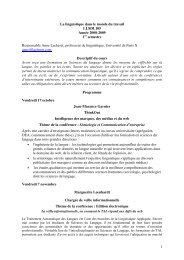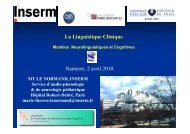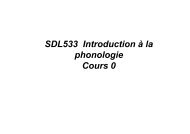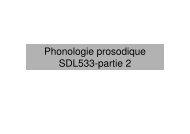You also want an ePaper? Increase the reach of your titles
YUMPU automatically turns print PDFs into web optimized ePapers that Google loves.
the usual expressions of pain can be feigned or misinterpreted. However, if I encounter<br />
another person writhing in pain, and instead of offering assistance or calling an<br />
ambulance or a doctor, I stand there interrogating the certainty of my knowledge of his<br />
pain, I am morally at fault.<br />
Another awareness can never be plumbed. As Cavell puts it, the best case<br />
scenario that seems so tempting in the case of a coffee cup is incoherent in the case of<br />
another person. The third person, God’s eye view of another human being requires<br />
reducing him to a physical entity and opening it up; that is, it requires murder. And of<br />
course, once another person is murdered, his awareness—the very thing the<br />
perpetrator wanted to get at—has fled. Another person is a whole world to which we<br />
have no access; but we have an interest in him, an empathic projection, and a moral<br />
obligation towards him. Moreover, the exploration of our own interest and obligation<br />
towards him will reveals the limits we may have consciously or unconsciously set to<br />
interest and obligation, or by contrast the depths of our commitment, and such<br />
knowledge is self-knowledge.<br />
What then are we doing, when we apprehend a dramatic character, the<br />
representation of a human being in a play or novel? Otherwise put, to whom are we<br />
listening? When we encounter a real human being, there is always a ‘more’ that we<br />
will never exhaust; can we say the same thing about a dramatis persona? If not, how<br />
can we take an interest in her? The Russian formalists sever the Gordian knot by<br />
claiming that a character is just a placeholder, a nodal point, in the formal structure of<br />
the plot. The job of the literary critic is accordingly just to trace the genealogy of plots,<br />
as they are transformed from one culture to another; and this is literary criticism that a<br />
logical positivist might approve.<br />
In his essay “A Gossip on Romance,” Robert Louis Stevenson (a fine essayist<br />
and travel writer as well as novelist and poet) answers my question: how can we be<br />
interested in a story whose protagonist is a mere placeholder? 1<br />
“No art produces illusion; in the theatre we never forget that we are<br />
in the theatre; and while we read a story, we sit wavering between<br />
two minds, now merely clapping our hands at the merit of the<br />
performance, now condescending to take an active part in fancy with<br />
the characters. This last is the triumph of romantic story-telling:<br />
when the reader consciously plays at being the hero, the scene is a<br />
good scene. Now, in character-studies the pleasure that we take is<br />
critical; we watch, we approve, we smile at incongruities, we are<br />
moved to sudden heats of sympathy with courage, suffering, or<br />
virtue. But the characters are still themselves, they are not us; the<br />
more clearly they are depicted, the more widely do they stand away<br />
from us, the more imperiously do they thrust us back into our place<br />
as a spectator. I cannot identify myself with Rawdon Crawley or<br />
with Eugene de Rastignac, for I have scarce a hope or fear in<br />
common with them. It is not character but incident that woos us out<br />
of our reserve. Something happens as we desire to have it happen to<br />
ourselves; some situation, that we have long dallied with in fancy, is<br />
realized in the story with enticing and appropriate details. Then we<br />
forget the characters; then we push the hero aside; then we plunge<br />
into the tale in our own person and bathe in fresh experience; and<br />
then, and then only, do we say we have been reading a romance.<br />
1 R. L. STEVENSON, Essays, New York, Charles Scribner’s Sons, 1918, p. 220-234.<br />
61

















